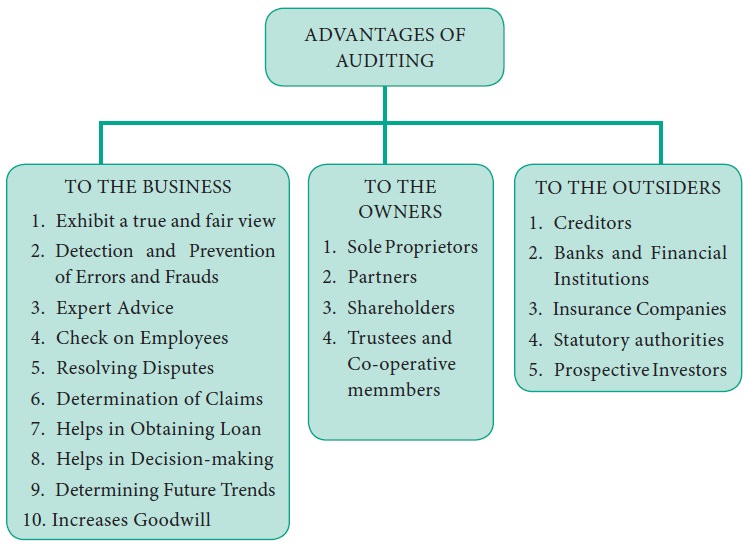Chapter: 11th Auditing : Chapter 1 : Introduction to Audit
Advantages of Auditing
Advantages of Auditing:
Auditing provides benefits to the business, owners
and to the outsiders in the following ways:

I. Benefits to the Business
1.
Exhibits
a True and Fair View of the Financial Statements: Audited accounts enables to reveal that the
Profit and Loss Account and Balance Sheet of the business concern shows a true
and fair view of the state of affairs of the business concern.
2.
Detection
and Prevention of Errors and Frauds: When books of accounts are audited, errors and frauds can be
detected and necessary action can be taken to prevent it.
3.
Expert
Advice: Auditors who possess professional
outlook provide expert advice to the company on various aspects such as tax
matters, internal check, internal control and submission of various reports to
the statutory authorities, preparation of project reports etc.
4.
Check on
Employees: When accounts
are audited it creates a moral pressure on the employees to be very
cautious and regular in their work, as a result the chances of errors and
frauds will be minimized.
5.
Helps in
Resolving Disputes: Audited accounts
provides a basis for settling disputes and conflicts among the partners in the
case of partnership firm and to settle disputes with regard to bonus, wages
etc. in the case of companies.
6.
Helps in
Determination of Claims: An insurance company settles claims to the
companies for the loss due to damage of business property only on the basis of
audited accounts.
7.
Helps in
Obtaining Loan: Loans can
be easily borrowed from banks and other financial institutions on the basis of
audited accounts, as the audited accounts authenticate the truthfulness of the
books of accounts and financial statements.
8.
Helps in
Decision-Making: Audited accounts
are relied upon for the purpose of decision-making by the management.
9.
Helps to
Determine Future Trends: By comparing the audited accounts with past years,
the trend of financial activities can be determined. On the basis of review,
weaknesses are found out and policies for the future period can be determined.
10. Increase in Goodwill: Audit of business on a regular basis increases
confidence to the interested parties and general public, as a result goodwill
of the business can be enhanced.
II. Benefits to the Owners
1. Benefits to the Sole Proprietors: Audited
accounts provide assurance to the proprietor about the accuracy of accounts
maintained by his employees and also enables to know the financial performance
of the business. It further enables the proprietor to obtain loan and in
computation of income tax liability.
2. Benefit to the Partners: In case
of partnership business, audited
accounts help the partners in settlement of accounts among the partners at the
time of admission, retirement or in the case of death of a partner.
3.
Benefit
to the Shareholders: Share holders
are the owners of the company. With the help of audited accounts, they get a
real picture of the financial position of the company and that directors and
managing directors have not taken any undue advantage of their position.
4.
Benefit
to Trust, Co-operative Societies: Audit of accounts of co-operative
societies and Trusts provide evidence that the interest of the beneficiaries
and members are properly protected.
III. Benefits to the Third Parties
1.
Bank and
Financial Institutions: Banks and
other financial institutions grant loan to the business concern on the basis of
audited financial statements.
2. Creditors: Creditors who supply goods to the business may assess the solvency and liquidity position of the business on the basis of audited accounts.
3. Insurance Companies: For
settlement of insurance claims,
insurance companies can rely on audited accounts.
4. Statutory Authorities: Statutory authorities like income tax, sales
tax, wealth tax etc. accept audited statements for determining the liability
which arises due to income, sales and wealth.
5.
Prospective
Investors: Prospective investors
who wish to invest money in shares and debentures of a company rely on audited
accounts.
Related Topics